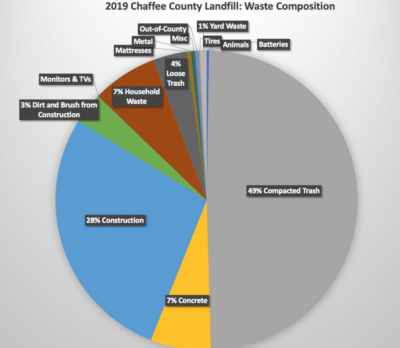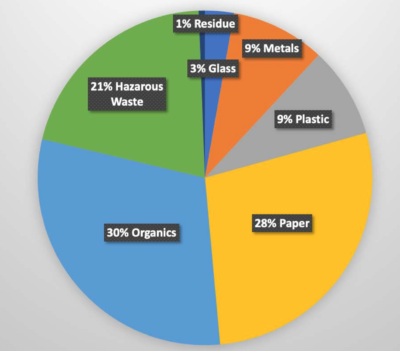The Greater Arkansas River Nature Association (GARNA) has completed a countywide Waste Audit Report using grant funding from the Chaffee County Community Foundation with support from Nestlé Waters North America (NWNA).
In Colorado, 95 percent of waste could be recycled or composted, while 32 percent of all trash could be recycled including bottles, cans and paper. Another 37 percent could be composted; including grass clippings, food waste and wood. According to the survey, some 26 percent of all of Colorado’s waste could be reused or recycled through specialized programs for textiles, electronics, construction materials and other “bulky materials”.

Waste Sorting (Image courtesy of Waste360)
According to the report, the data collected from the report suggests it is possible for Chaffee County to achieve similar rates if partnerships were formed with recyclers, businesses in Chaffee and other counties. Increased engagement from Chaffee residents and businesses would also be needed.
Three commercial waste services: Chaffee County Waste, Shamrock Disposal Services and Waste Management serve the county. Data was provided from 2018, 2019 and the first quarter of 2020. Recycling providers included Angel of Shavano, Chaffee County Waste and Elements Mountain Compost. In order to compare waste services providers and the type of material collected, volume and counts were converted into weights.

This graph depicts waste generated and diverted in Chaffee County in 2018 and 2019.
The Results
In 2018 Chaffee County residents and visitors generated 25,420 tons of waste. 2,058 were either recycled or composted. In 2019, Chaffee generated 26,237 tons with only 1,912 tons being recycled or composted.
The amount of waste generated in 2019 was sorted by material type. Compacted trash made up 49 percent of waste. Compacted trash includes solid waste picked up at residences as well as waste generated by local businesses and public buildings.

The graph shows waste sent to Chaffee County Landfill in 2019 by Type of Material.
Household Waste is that which residents take to the landfill themselves. It makes up only seven percent of the total waste generated. According to a study done by the U.S. Environmental Protection Agency (EPA) and confirmed by the Upper Arkansas Area Council of Governments (UAACOG), food scraps and yard waste make up 30 percent of what is thrown away. This “trash” along with dirt, brush from construction and yard waste could be composted. Composting keeps these materials out of landfills where they release methane gas and take up space.
The report states that the next few years will be crucial for putting Colorado on the path to creating a more circular economy where more discarded materials are transformed into new products or composted.

Composition of Compacted Trash (MSW) found by the UAACOG Regional Waste Study in 2017.
The report makes five recommendations.
The first is exploring ways to divert compost-able material from the landfill. Making this single change would divert more than 2,000 tons from the landfill annually. It is suggested that curbside “green bins” would make a convenient way for community members to implement compositing.
The second suggestion is replicating the Eagle County “Drop N’ Swap Program”. Users would be able to drop off items that still work, are in good condition or can be reused by someone else. Third is making curbside recycling mandatory. Bins would be offered as part of regular trash service.
Fourth, the report recommends that the county explore ways to keep recyclable materials flowing within the local economy. Most materials collected for recycling in the county are shipped out of state. Local waste diversion solutions could attract new businesses to the county and keep reused materials flowing within the community, while reducing pollution.
The last possible solution recommended by the report is the creation of a waste diversion plan for Chaffee County, which would set realistic goals based on community needs. This would require collaboration with GARNA and other organizations to conduct annual waste audits, create partnerships with waste related businesses and educate the community.
The report concluded with this thought: that it is more important than ever to strengthen Colorado’s commitment to protect the health of residents, ecology, the economy through building smart, sustainable communities.
To view the full report, click here.







Recent Comments